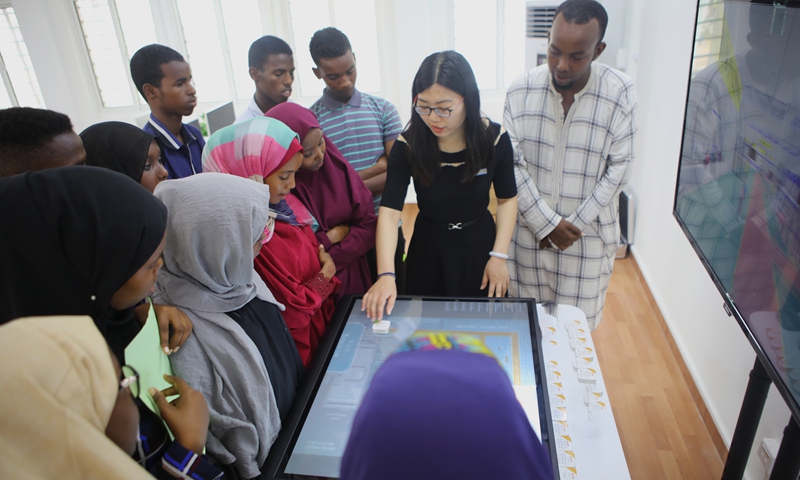China's Luban Workshop creates a pool of skilled workers for developing countries, injects vitality into local economies

A Chinese teacher guides local students at the Luban Workshop in Djibouti in March 2019. Photo: Courtesy of Tianjin First Commercial School
Near the bustling Djibouti port, one of the most important ports in Africa, sits a several-square-meter-large Luban Workshop, a Chinese supported skill and vocational training project. Named after Lu Ban, an ancient Chinese woodcraft master who was born in 507BC during China's Zhou dynasty, the Luban Workshop is also Djibouti's first institute of vocational education designated to improve the professional skills of the local workforce.
Liban Fouad Osman, who enrolled at the Luban Workshop in 2019, the same year the institute was set up in the country, is set to graduate by the end of this year, after three years of intensive railway skill training. After graduating, Osman, along with his other 23 classmates, will start working for the Addis Ababa-Djibouti Railway, the first electrified railway in Africa constructed by a consortium formed by China Civil Engineering Construction Corporation (CCECC) and China Rail Engineering Corporation.
Addis Ababa-Djibouti Railway is a mega infrastructure project under the China-proposed Belt and Road Initiative (BRI), and the railway has fostered the development of various industries in neighboring areas, which in turn calls for an amassing pool of professional workers. In the Vision 2035 put forward by Djibouti, the country aims to build itself into a regional transportation hub in Africa and a logistic, business, and financial center in East Africa.
Nurturing local talent
"Students at the workshop are taught in a model called 'order-form teaching,' which means that they are trained and equipped with targeted skills in collaboration with the enterprises they will work at after graduating," Yu Zhongwu, president of Tianjin Railway Technical and Vocational College (TRTVC), told the Global Times on Saturday.
CCECC, along with two Tianjin vocational colleges including TRTVC and Tianjin First Commercial School (TFCS), as well as the Tianjin municipal government and the Education Ministry of Djibouti, jointly established the Luban Workshop, which is first of its kind workshop in Africa that embodies Chinese craftsmanship.
"We set up four majors at the workshop including operation and management of railway, rail engineering technology, business and logistics. The four majors have been certificated by local education authorities," Yu said, adding that the school blazes the trail in Djibouti's higher vocational education.
Building upon an improved infrastructure network, Djibouti is also constructing a free trade area (FTA) surrounding the Djibouti Port. Zhai Jingjing, vice director of TFCS' financial and business institute, told the Global Times on Friday that the workshop also trained talent for the FTA, leveraging TFCS' expertise in business operation.
Africa is rich in young and able workers, and the professional training at the workshop also offers a new career path for African youth like Osman, improving their future livelihoods, observers said.
Chinese Vice Premier Sun Chunlan announced at the opening of the World Vocational and Technical Education Development Conference (WVTEDC) on Friday in Tianjin via a video link that China will build 20 more Luban Workshops with BRI countries, and set up 20 more vocational education training centers in Africa, so as to "contribute Chinese wisdom to the development of vocational education in developing countries."
In September 2018, China announced that it would build 10 Luban Workshops in Africa to provide vocational training courses to African youth, as part of efforts to deepen pragmatic cooperation with Africa and support the development of Africa.
'Teach them how to fish'
To date, China has established about 20 Luban Workshops in 19 countries and regions, including Thailand, the UK, India, Indonesia, Pakistan and Djibouti. Luban Workshop has become a bridge of friendship between China and foreign countries in educational exchange.
Afifa Shajia Awais, the Education Attaché of the Embassy of Pakistan, told the Global Times on the sidelines of the conference on Friday that Pakistan is in urgent need of more vocational training amid rapid industrialization, and the set-up of more Luban Workshop is "in line with the requirements of the industries," which is also helpful in creating more jobs.
"To develop our human resources, I would stress the need for the two countries to engage more on different layers of [vocational education] and increase our cooperation opportunities," she said.
At WVTEDC's opening ceremony, Sun announced that China will launch a global vocational technological education alliance to facilitate pragmatic cooperation in the sector.
China also proposed to set up global vocational education reward scheme, Sun said.
"The Luban Workshop model exports Chinese-standard vocational education, and its most important task is to train local teachers, and they, in turn, will take the responsibilities to educate local students, and this model will inject vitality to the sustainable development of local economy," Yao Song, the director of IT and automation institute under the Tianjin Light Industry Vocational Technical College, told the Global Times on Friday.
The college has participated in the construction of Luban Workshops in India and Egypt.
As the old saying goes, "give a man a fish and you feed him for a day. Teach a man how to fish and you feed him for a lifetime." A total of 12,000 people around the world have received vocational training in Luban Workshops, and a total of 66 Chinese and foreign enterprises have established cooperation with Luban Workshop.
At the conference, industry insiders also took note of a critical role the workshop plays in securing talent that lay the foundation for carrying out BRI projects.
"Most majors the workshop set up are in industries where there's a huge talent gap. In this regard, it will strengthen the competitiveness of firms in those industries and promote a synergized development of local economy," Yang Yan, vice director of Tianjin Luban Workshop Promotion center, said at the forum.



